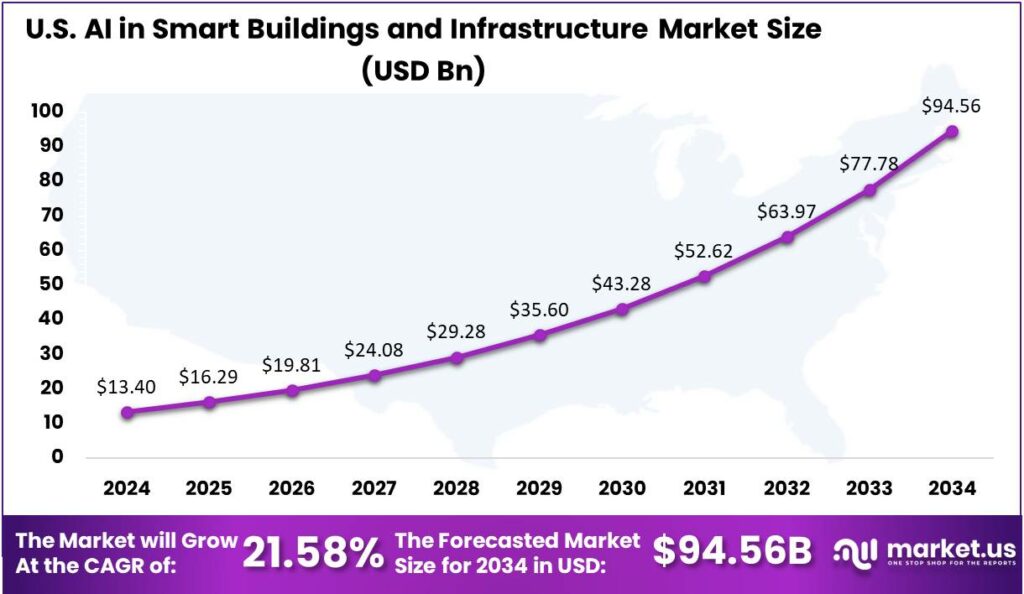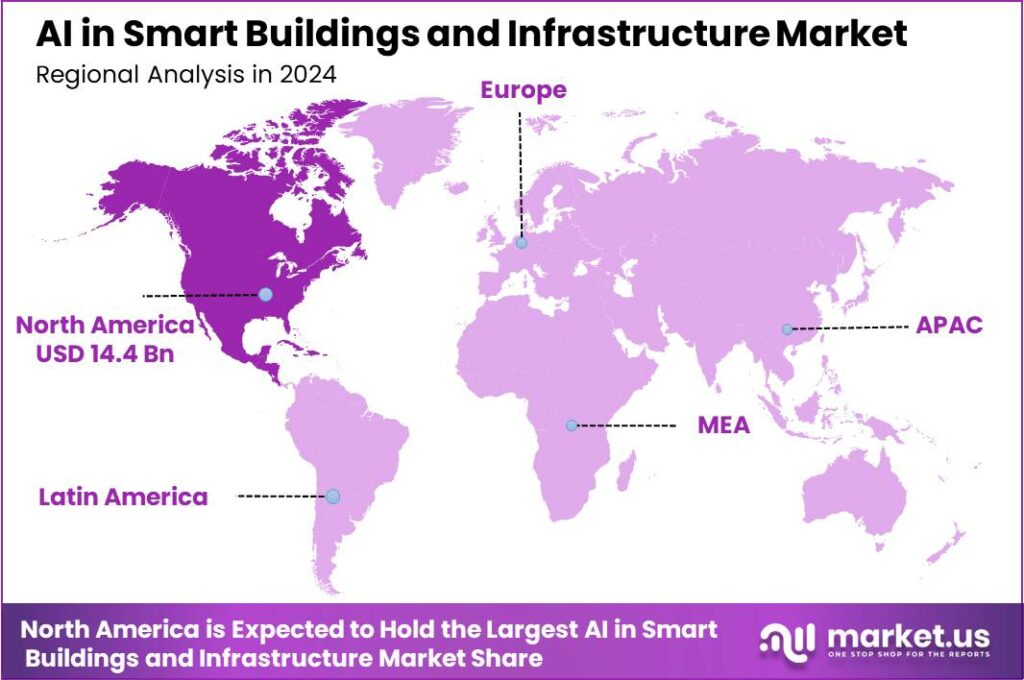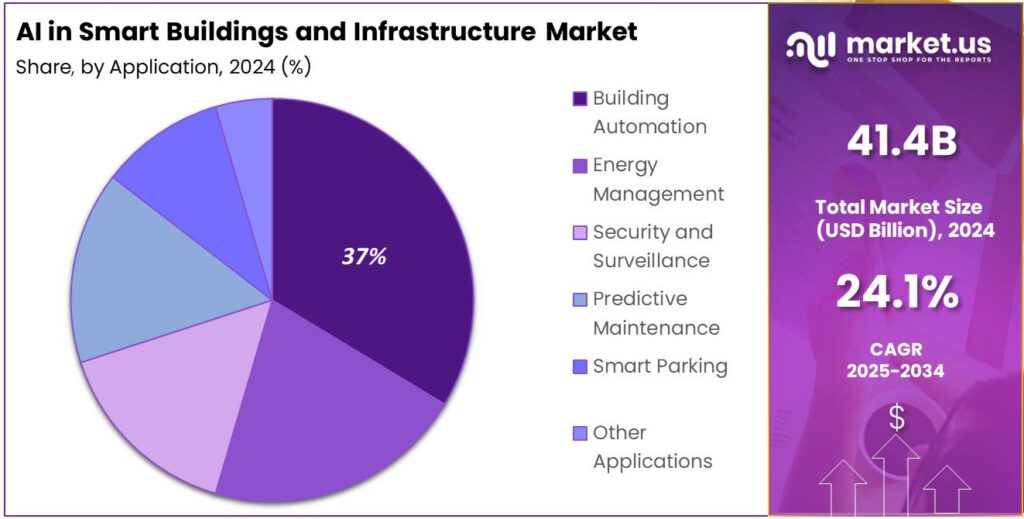Global AI in Smart Buildings and Infrastructure Market Size, Share, Statistics Analysis Report By Technology (Machine Learning, Natural Language Processing, Computer Vision, Robotic Process Automation, Other Technologies), By Application (Building Automation, Energy Management, Security and Surveillance, Predictive Maintenance, Smart Parking, Other Applications), By End-User Industry (Residential, Commercial, Industrial, Government and Public Sector), Region and Companies - Industry Segment Outlook, Market Assessment, Competition Scenario, Trends and Forecast 2025-2034
- Published date: January 2025
- Report ID: 138406
- Number of Pages: 201
- Format:
-
keyboard_arrow_up
Quick Navigation
Report Overview
The AI in Smart Buildings and Infrastructure Market size is expected to be worth around USD 359 Bn By 2034, from USD 41.4 Bn in 2024, growing at a CAGR of 24.10% during the forecast period from 2025 to 2034. In 2024, North America led the AI in Smart Buildings and Infrastructure market with a 35% share, generating USD 14.4 bn. The U.S. market, valued at USD 13.4 bn, is projected to grow at a CAGR of 21.5%.
Artificial Intelligence (AI) in smart buildings and infrastructure refers to the integration of AI technologies to manage and optimize building operations efficiently. This integration aids in various functions, including energy management, security, lighting, and HVAC systems, using data-driven insights to automate and enhance building environments for better operational efficiency and occupant comfort.
The growth of AI in smart buildings is primarily driven by the need to enhance operational efficiency and sustainability in response to escalating urbanization challenges. AI enables proactive management of building systems, reducing energy use and maintenance costs while improving safety and security through advanced surveillance and anomaly detection techniques.

The integration of AI with IoT devices, predictive maintenance, and user-centric services like automated environmental controls and smart energy management are key trends. These advancements are supported by ongoing innovations in AI that continuously improve building intelligence over time, adapting to new data and environmental changes.
Demand is surging for AI solutions that can provide increased energy efficiency, enhanced security measures, and improved overall operational effectiveness in buildings. Commercial real estate, healthcare facilities, and residential complexes are particularly keen on adopting these AI-driven systems to optimize space utilization and resource management.
Stakeholders benefit from significant cost reductions, operational efficiencies, and the ability to meet sustainability goals. AI’s capability to analyze vast amounts of data in real-time allows for more informed decision-making and better management of resources. Additionally, AI-enhanced buildings offer improved comfort and safety for occupants, presenting a strong value proposition to building owners and managers.
Key Takeaways
- The AI in Smart Buildings and Infrastructure Market size is projected to reach USD 359 billion by 2034, growing from USD 41.4 billion in 2024, at a compound annual growth rate (CAGR) of 24.10% during the forecast period from 2025 to 2034.
- In 2024, the Machine Learning segment held a dominant position in the market, capturing more than 40% of the market share.
- The Building Automation segment also held a dominant position in the AI in Smart Buildings and Infrastructure market in 2024, with more than 37% of the market share.
- The Commercial segment was another major contributor in 2024, capturing over 32% of the market share.
- In 2024, North America dominated the AI in Smart Buildings and Infrastructure market, holding a market share of more than 35%, with revenues reaching USD 14.4 billion.
- The U.S. AI in Smart Buildings and Infrastructure Market, valued at USD 13.4 billion in 2024, is expected to grow at a CAGR of 21.58%.
U.S. Market Size and Growth
The U.S. AI in Smart Buildings and Infrastructure Market, which was valued at US$ 13.4 billion in 2024, is projected to grow at a CAGR of 21.58%. This growth highlights AI’s expanding role in improving building design, management, and maintenance, helping businesses boost efficiency and sustainability.
Artificial intelligence is transforming the smart building sector by enabling more adaptive and responsive building management systems. These systems utilize AI to analyze data from various sensors and IoT devices within buildings, leading to smarter decision-making regarding energy consumption, space utilization, and maintenance scheduling.
AI-driven analytics are enabling predictive maintenance, reducing downtime and extending building infrastructure lifespan. By forecasting equipment failures, facility managers can make proactive repairs, cutting costs and supporting the growth of smart building management.

In 2024, North America held a dominant market position in the AI in Smart Buildings and Infrastructure sector, capturing more than a 35% share with revenues reaching USD 14.4 billion. This leading position can be attributed to several key factors that are unique to the North American market.
Primarily, the region benefits from a highly developed technological infrastructure, which supports the widespread deployment of advanced AI solutions. Additionally, there is a strong presence of leading AI technology firms and startups in North America, particularly in the United States, which drives innovation and adoption in this sector.
Moreover, North American businesses and government policies are increasingly focusing on sustainability and energy efficiency, which fuels the demand for smart building solutions. The integration of AI helps in optimizing building operations, significantly reducing energy consumption, and lowering carbon footprints, making a compelling case for companies looking to invest in greener technologies.

Technology Analysis
In 2024, the Machine Learning segment held a dominant position in the AI in Smart Buildings and Infrastructure market, capturing more than a 40% share. This technology leads because of its ability to analyze vast amounts of data from various building sensors to optimize energy usage and maintenance schedules.
Machine learning algorithms improve over time, adapting to the behavior and preferences of building occupants, thereby increasing operational efficiency and comfort. This adaptability makes it especially valuable in energy management and predictive maintenance, areas critical to reducing operational costs and enhancing building longevity.
Machine learning plays a key role in Building Management Systems (BMS), automating tasks like air quality control, temperature, and lighting based on real-time data. Its ability to learn and predict behaviors reduces human intervention, creating more autonomous and efficient building environments.
The growth of machine learning is driven by advancements in IoT and the increasing volume of building data. As buildings become smarter, machine learning is essential for extracting actionable insights, improving operations, and supporting strategic decision-making in building management.
Application Analysis
In 2024, the Building Automation segment held a dominant position in the AI in Smart Buildings and Infrastructure market, capturing more than a 37% share. This segment leads primarily because building automation systems (BAS) are central to enhancing operational efficiency and occupant comfort in modern infrastructure.
The integration of AI into these systems allows for automated control of various building functions such as heating, ventilation, air conditioning (HVAC), lighting, and other systems, based on real-time data and predictive analytics. This not only ensures optimal operational performance but also significantly reduces energy costs and increases the lifespan of the equipment used.
The prominence of the Building Automation segment is further bolstered by the increasing adoption of green building practices. As regulatory bodies worldwide push for stricter compliance with energy efficiency standards, AI-enabled building automation systems become crucial.
The evolution of IoT devices has boosted building automation systems, enabling AI algorithms to process vast data from sensors for real-time adjustments and predictions. This dynamic system management caters to complex building operations and occupant preferences, strengthening the role of building automation in the smart building market.

End-User Industry Analysis
In 2024, the Commercial segment held a dominant position in the AI in Smart Buildings and Infrastructure market, capturing more than a 32% share. This segment leads primarily due to its high rate of technology adoption aimed at improving operational efficiencies, energy savings, and building management systems.
Commercial buildings, ranging from office spaces to retail complexes, are increasingly integrating AI to optimize everything from heating, ventilation, and air conditioning (HVAC) systems to security and lighting systems.
The significant share of the Commercial segment can also be attributed to the growing emphasis on sustainability and regulatory compliance. As governments worldwide tighten regulations on energy consumption and emissions, commercial building operators are turning to AI-enabled solutions to ensure compliance and sustainability.
The integration of AI with IoT devices drives growth in the commercial market. In smart buildings, AI algorithms use data from IoT sensors to automate processes like air quality monitoring and predictive maintenance, improving efficiency and safety. This creates adaptive, personalized environments, fueling strong growth in the commercial segment.
Key Market Segments
By Technology
- Machine Learning
- Natural Language Processing
- Computer Vision
- Robotic Process Automation
- Other Technologies
By Application
- Building Automation
- Energy Management
- Security and Surveillance
- Predictive Maintenance
- Smart Parking
- Other Applications
By End-User Industry
- Residential
- Commercial
- Industrial
- Government and Public Sector
Key Regions and Countries
- North America
- US
- Canada
- Europe
- Germany
- France
- The UK
- Spain
- Italy
- Rest of Europe
- Asia Pacific
- China
- Japan
- South Korea
- India
- Australia
- Singapore
- Rest of Asia Pacific
- Latin America
- Brazil
- Mexico
- Rest of Latin America
- Middle East & Africa
- South Africa
- Saudi Arabia
- UAE
- Rest of MEA
Driver
Enhancing Energy Efficiency
Artificial Intelligence (AI) is transforming how buildings manage energy consumption. By integrating AI into systems like heating, ventilation, and air conditioning (HVAC), buildings can adjust settings in real-time based on factors such as occupancy and weather.
AI can monitor the condition of equipment and predict when maintenance is needed, preventing system failures and ensuring optimal performance. This reduces downtime and energy waste caused by inefficient systems.
AI can control lighting systems by adjusting brightness based on occupancy and natural light levels. This ensures that lights are only on when needed, further cutting energy consumption.
Restraint
High Initial Implementation Costs
While AI offers numerous benefits, the initial costs of integrating AI solutions into building infrastructure can be prohibitive. Expenses related to hardware, software, and the need for skilled professionals to manage these systems can deter building owners from adopting AI technologies.
Additionally, existing buildings may require significant upgrades to accommodate AI systems, further escalating costs. These financial barriers can slow the widespread adoption of AI in smart buildings, especially among smaller enterprises or in regions with limited access to capital.
Opportunity
Advancements in AI Technologies
The rapid development of AI technologies presents a significant opportunity for smart buildings. Innovations in machine learning, natural language processing, and computer vision are leading to more sophisticated applications in building management. For example, AI can predict equipment failures before they occur, allowing for proactive maintenance and reducing downtime.
Furthermore, AI-driven analytics can provide insights into occupant behavior, enabling the customization of environments to enhance comfort and productivity. As AI continues to evolve, its applications in smart buildings are expected to become more advanced, offering solutions that were previously unattainable.
Challenge
Data Privacy and Security Concerns
The integration of AI in building systems necessitates the collection and analysis of vast amounts of data, including information about occupants’ behaviors and preferences. This data collection raises significant privacy and security concerns. Unauthorized access or breaches could lead to the misuse of sensitive information, eroding trust among building occupants.
Moreover, compliance with data protection regulations adds complexity to AI implementation. Addressing these concerns requires robust cybersecurity measures and transparent data management policies to ensure that the benefits of AI are realized without compromising individual privacy.
Emerging Trends
Artificial Intelligence (AI) is transforming how we design and manage buildings and infrastructure. One significant trend is the use of AI to enhance energy efficiency. By analyzing data from various sensors, AI systems can adjust lighting, heating, and cooling in real-time, ensuring optimal energy use.
Another emerging trend is predictive maintenance. AI monitors equipment performance and predicts potential failures before they occur. This proactive approach reduces downtime and maintenance costs. For example, in HVAC systems, AI can detect anomalies and schedule maintenance, preventing costly breakdowns.
Incorporating AI into building design is another notable trend. Architects use AI to optimize layouts for natural light, airflow, and space utilization, creating more comfortable and efficient environments. AI can generate multiple design scenarios, helping architects choose the best options for sustainability and occupant well-being.
Business Benefits
The integration of AI in smart buildings offers numerous business benefits. One of the most significant advantages is cost savings through improved energy efficiency. By optimizing energy consumption, businesses can reduce utility expenses significantly.
Enhanced operational efficiency is another benefit. AI streamlines building management by automating routine tasks and providing insights into system performance. This automation allows facility managers to focus on strategic activities, improving overall productivity.
AI also contributes to better space utilization. By analyzing occupancy patterns, AI can suggest ways to optimize the use of available space, potentially reducing the need for additional real estate. This optimization can lead to cost savings and more efficient operations.
Key Player Analysis
- AI-driven companies in smart buildings are innovating to enhance functionality, sustainability, and occupant satisfaction.
- Siemens AG is a leader in AI-powered smart buildings and infrastructure, offering solutions for automation, building management, and energy efficiency. Their portfolio includes AI-driven systems for building management, fire safety, and security, optimizing energy use, enhancing safety, and reducing costs.
- Honeywell International Inc. is another key player making significant strides in the AI-driven smart buildings sector. With a focus on energy efficiency and safety, Honeywell’s AI solutions help buildings to optimize energy consumption, reduce waste, and provide real-time monitoring for enhanced security.
- Johnson Controls International PLC is a top-tier player in the AI for smart buildings market, offering a wide range of products and services that enhance building performance and sustainability. Known for their expertise in HVAC (heating, ventilation, and air conditioning) systems, Johnson Controls uses AI to optimize these systems for energy efficiency, comfort, and cost reduction.
Top Key Players in the Market
- Siemens AG
- Honeywell International Inc.
- Johnson Controls International pl
- Schneider Electric SE
- IBM Corporation
- Cisco Systems, Inc.
- Microsoft Corporation
- Intel Corporation
- Google LLC
- Amazon Web Services, Inc.
- General Electric Company
- ABB Ltd.
- Oracle Corporation
- Huawei Technologies Co., Ltd.
- Hitachi, Ltd.
- Other Key Players
Top Opportunities Awaiting for Players
- Generative AI in Design and Operations: AI is expected to be deeply integrated into the workflows of architecture, construction, and operations. This will include everything from generating efficient floor plans to managing real-time IoT data for predictive maintenance, significantly enhancing operational efficiency and sustainability efforts.
- Open Source Smart Building Platforms: The move towards open-source platforms is gaining momentum. This shift is driven by the need for interoperability among various systems within smart buildings, which allows for greater flexibility and future-proofing, attracting new talent and fostering innovation.
- Enhanced Security and Safety: AI technologies are revolutionizing building security by improving the intelligence, efficiency, and responsiveness of security systems. This includes AI-powered cameras and sensors that detect anomalies and coordinate automated responses during emergencies, significantly enhancing the safety of occupants.
- Sustainability Metrics as Tangible Currency: There is a growing demand for quantifiable sustainability metrics. Smart buildings in 2025 will likely face increased regulatory and investor pressures to demonstrate their environmental impact. This includes detailed carbon accounting and the integration of systems with renewable energy sources to optimize energy use.
- Optimized Space Utilization and Tenant Experience: AI will play a crucial role in optimizing space utilization, reducing operational costs, and enhancing tenant engagement. By analyzing data on occupancy and usage, AI enables more efficient space management and offers personalized environmental settings, improving the overall occupant experience.
Recent Developments
- In January 2025, Trane Technologies, a leader in climate innovation, has acquired BrainBox AI, a pioneer in autonomous HVAC systems powered by generative AI. BrainBox AI uses deep learning to predict energy needs and optimize HVAC performance, helping reduce energy consumption and cut greenhouse gas emissions.
Report Scope
Report Features Description Market Value (2024) USD 41.4 Bn Forecast Revenue (2034) USD 359 Bn CAGR (2025-2034) 24.10% Base Year for Estimation 2024 Historic Period 2020-2023 Forecast Period 2025-2034 Report Coverage Revenue Forecast, Market Dynamics, COVID-19 Impact, Competitive Landscape, Recent Developments Segments Covered By Technology (Machine Learning, Natural Language Processing, Computer Vision, Robotic Process Automation, Other Technologies), By Application (Building Automation, Energy Management, Security and Surveillance, Predictive Maintenance, Smart Parking, Other Applications), By End-User Industry (Residential, Commercial, Industrial, Government and Public Sector) Regional Analysis North America – US, Canada; Europe – Germany, France, The UK, Spain, Italy, Russia, Netherlands, Rest of Europe; Asia Pacific – China, Japan, South Korea, India, New Zealand, Singapore, Thailand, Vietnam, Rest of APAC; Latin America – Brazil, Mexico, Rest of Latin America; Middle East & Africa – South Africa, Saudi Arabia, UAE, Rest of MEA Competitive Landscape Siemens AG, Honeywell International Inc., Johnson Controls International pl, Schneider Electric SE, IBM Corporation, Cisco Systems, Inc., Microsoft Corporation, Intel Corporation, Google LLC, Amazon Web Services, Inc., General Electric Company, ABB Ltd., Oracle Corporation, Huawei Technologies Co., Ltd., Hitachi, Ltd., Other Key Players Customization Scope Customization for segments, region/country-level will be provided. Moreover, additional customization can be done based on the requirements. Purchase Options We have three license to opt for: Single User License, Multi-User License (Up to 5 Users), Corporate Use License (Unlimited User and Printable PDF)  AI in Smart Buildings and Infrastructure MarketPublished date: January 2025add_shopping_cartBuy Now get_appDownload Sample
AI in Smart Buildings and Infrastructure MarketPublished date: January 2025add_shopping_cartBuy Now get_appDownload Sample -
-
- Siemens AG
- Honeywell International Inc.
- Johnson Controls International pl
- Schneider Electric SE
- IBM Corporation
- Cisco Systems, Inc.
- Microsoft Corporation
- Intel Corporation
- Google LLC
- Amazon Web Services, Inc.
- General Electric Company
- ABB Ltd.
- Oracle Corporation
- Huawei Technologies Co., Ltd.
- Hitachi, Ltd.
- Other Key Players













